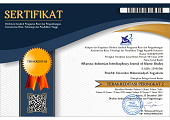Gagasan dan Manifestasi Neo-Sufisme dalam Muhammadiyah: Sebuah Analisis Teoretik
Abstract
Keywords
Full Text:
PDFReferences
Abdurrahman, Moeslim. 2003. Islam Sebagai Kritik Sosial, Jakarta: Erlangga.
Abdurrahman, Moeslim. 2009. Suara Tuhan, Suara Pemerdekaan: Menuju Demokrasi dan Kesadaran Bernegara, Yogyakarta: Kanisius.
Abdurrahman, Moeslim. 1989. Teologi Pembangunan: Paradigma Baru Pemikiran Islam, Yogyakarta: Lajnah Kajian Pengembangan Sumberdaya Manusia NU DIY.
Abdurrahman, Moeslim. 1996. Islam Transformatif, Jakarta: Pustaka Firdaus.
Abdurrahman, Moeslim. 2005. Islam yang Memihak, Yogyakarta: LKiS.
Alfian. 2010. Politik Kaum Modernis, Perlawanan Muhammadiyah terhadap Kolonial Belanda, Jakarta: al-Wasath Publising Press.
Amjad-Ali, Charles. 2009. “Christian Ethics and Witness in the Context of Globalism, the Clash of Civilisations and the American Empire,” Allan Boesak Len Hansen (ed.), Globalisation: The Politics of Empire, Justice and the Life of Faith. Stellenbosch: SUN Press. hal. 100.
Beck, Herman L.. 2001. “The Borderline between Moslem Fundamentalism and Moslem Modernism: An Indonesian Example,” dalam Jan Willen Van Henten dan Anton Houtepen (eds.), Religious Identity and the Invention of Tradition, The Netherlands: Koninklijke Van Gorcum: 279-291.
Dabashi, Hasim. 2008. “Resisting the Empire,” Islamic Liberation Theology: Resisting the Empire. New York: Routledge.
Effendi, Djohan. 2010. Pembaruan Tanpa Membongkar Tradisi. Wacana Keagamaan di Kalangan Generasi Muda NU, Masa Kepemimpinan Gus Dur, Jakarta: Kompas.
Foucault, Michel. 1998. “On the archeology of sciences: Response to the epistemology circle,” in part two, “Epistemology and Methodology,” Aesthetics, Method and Epistemology: Essential Works of Foucault 1954-1984, New York: The New Press. hal. 297-334.
Hallaq, Whael B. 2004. “Early Ijtihad and the Later Construction of Authority,” Authority, Continuity and Change in Islamic Law, Cambridge: Cambridge University Press. hal. 24-56.
Heryanto, Ariel. 2006. State Terrorism and Political Identity in Indonesia: Fatally Belonging, New York: Routledge.
Kuntowijoyo. 2006. “Etika Paradigma Islam,” Islam sebagai Ilmu: Epistemologi, Metodologi dan Etika, Yogyakarta: Tiara Wacana. hal. 85.
Kuntowijoyo. 2000. “Jalan Baru Muhammadiyah,” dalam Abdul Munir Mulkhan, Islam Murni dalam Masyarakat Petani, Yogyakarta: Yayasan Bentang Budaya. hal. xvii.
Kuntowijoyo. 2006. Islam sebagai Ilmu: Epistemologi, Metodologi dan Etika, Yogyakarta: Tiara Wacana.
Kuntowijoyo. 1991. Paradigma Islam: Interpretasi untuk Aksi, Bandung: Mizan.
Kuntowjoyo. 2001. “Ilmu Sosial Profetik: Etika Pengembangan Ilmu-Ilmu Sosial,” Muslim Tanpa Masjid, Bandung: Mizan. h 357-376.
Kuntowjoyo. 2001. “Ilmu Sosial Profetik: Etika Pengembangan Ilmu-Ilmu Sosial,” Muslim Tanpa Masjid, Bandung: Mizan, h. 357; 358; 366-9.
Mannheim, Karl. 1936. “The Two Divisions of the Sociology of Knowledge,” Ideology and Utopia, New York: Harvest Book, h. 266-289.
Mossallenejad, Ezzat. 2012. “Geography of Retun,” Religion and the Cruel Return of Gods. Toronto: Zagros Editions.
Mulkhan, Abdul Munir. 2007. “Al-Quran dan Pragmatisasi Amal Saleh,” Manusia al-Quran: Jalan Ketiga Religiositas di Indonesia, Yogyakarta: Kanisius.
Mulkhan, Abdul Munir. 2005. Kesalehan Multikultural, Jakarta: PSAP.
Mulkhan, Abdul Munir. 2000. Neo-Sufisme dan Pudarnya Fundamentalisme di Pedesaan, Yogyakarta: UII Press.
Najib, Muhammad dan Irwan Omar. 2003. Putra Nusantara: Mohammad Amien Rais, Singapura: Stamford Press.
Nakamura, Mitsuo, “Rationality and Enlightenment: A Comparison of Educational Reforms Promoted by Gülen Movement and Muhammadiyah,” Paper yang dipresentasikan di dalam program International Fethullah Gülen Conference Indonesia, pada tahun 2010. http://www.fethullahgulenchair.com/(diakses pada 7 Januari 2015).
Nashir, Haedar dkk., (penghimpun dan editor). 2013. Manhaj Gerakan Muhammadiyah: Ideologi, Khittah dan Langkah, Yogyakarta: Suara Muhammadiyah dan Majelis Pendidikan Kader PP. Muhammadiyah.
Putra, Heddy Sri-Ahimsa. 2011. Paradigma Profetik: Mungkinkah? Perlukah?, Makalah Sarasehan Profetik 2011, Sekolah Pascasarjana UGM, di Yogyakarta, 10 Februari.
Rahman, Fazlur. 1984. Islam and Modernity: Transformation of an Intellectual Tradition, Chicago: The University of Chicago Press.
Rahman, Fazlur. 1979. Islam, Chicago: The University of Chicago Press.
Rahman, Fazlur. 2003. Revival and Reform in Islam: A Study of Islamic Fundamentalism, Oxford: Oneworld.
Rais, M. Amien. 1998. Tauhid Sosial: Formula Menggempur Kesenjangan, Bandung: Mizan.
Salam, J. 1968. K.H.A. Dahlan, Amal dan Perdjoangannja, Djakarta: Depot Pengajaran Muhammadijah.
Susetiawan. 2010. “Kesejahteraan Masyarakat yang Terpasung: Ketidakberdayaan Para Pihak Relawan Konstruksi Neoliberalisme,” Media Inovasi: Jurnal Ilmu dan Kemanusiaan, Edisi Khusus Muktamar Satu Abad Muhammadiyah, h. 99-105.
Taimiyyah, Ibn. 1391. Al-Risâlah al-Tadammuriyyah, Beirut: al-Maktabah al-Islamiyah.
H.
Taimiyyah, Ibn. 1409 H. Kitab al-Istiqâmah, Vol. I, Kairo: Maktabah al-Sunnah.
Taimiyyah, Ibn, Kitâb al-Radd ‘ala al-Mantiqiyyîn, Beirut: Dâr al-Ma’rifah, t.th.
Taimiyyah, Ibn. 1398 H. Majmû’ Fatawâ, Vol IV, Beirut: Dar al-Arabiyah.
Taimiyyah, Ibn. 1398 H. Majmû’ Fatawâ, Vol IX, Beirut: Dar al-Arabiyah.
DOI: https://doi.org/10.18196/aiijis.2015.0047.157-194
Refbacks
- There are currently no refbacks.
Copyright (c) 2015 Afkaruna: Indonesian Interdisciplinary Journal of Islamic Studies

This work is licensed under a Creative Commons Attribution-ShareAlike 4.0 International License.
Afkaruna: Indonesian Interdiciplinary Journal of Islamic Studies indexed by:












1.png)


